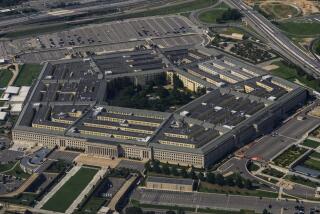Ex-Marine to face civilian trial
- Share via
SAN DIEGO — When the trial of a former Marine begins Tuesday in federal court in Riverside, it will mark the first time a little-known federal law has been used to prosecute a former Marine or soldier for actions during combat.
A jury of civilians will decide the fate of former Marine Sgt. Jose Nazario, 28, who is accused in the killing of four Iraqi prisoners.
The law wasn’t originally crafted to target military personnel. Passed by Congress in 2000, the Military Extraterritorial Jurisdiction Act was designed to allow the prosecution of civilians employed by the Department of Defense for crimes committed while overseas on official business.
The act was meant to close a loophole that allowed civilians to escape prosecution for serious crimes because they were not subject to military law and U.S. prosecutors lacked jurisdiction.
Nazario is being tried in federal court because he had left active duty when the Naval Criminal Investigative Service began its investigation. Two other Marine sergeants, still on active duty, are set for courts- martial at Camp Pendleton in the case, in which all the jurors will be Marines.
Nazario is charged with voluntary manslaughter, assault with a deadly weapon and discharging a firearm during a crime of violence in the alleged killing of the four Iraqi prisoners during the battle in Fallouja on Nov. 9, 2004.
Defense attorneys may argue that the Marines did not have time to process the prisoners according to the Geneva Convention because they needed to rush to reinforce other Marines engaged in firefights.
Gary Solis, a former Marine Corps lawyer and now a law professor at Georgetown University, said he supported the law as a “means of reaching those who have committed crimes in the combat zone -- military people whose crimes go undetected until after they have left the service” and are no longer subject to military justice.
One of the imponderables of Nazario’s case is whether a civilian jury will be more sympathetic or less so than a military jury.
To some of Nazario’s supporters -- including active-duty and retired Marines -- the idea of a civilian judge, civilian prosecutors and civilian jury members deciding the fate of a Marine for a combat decision is repugnant.
“He can only get a fair shake if those civilians are honorably discharged Marines who fought” in Fallouja, said William McNulty, secretary of the Marine Corps Intelligence Assn., a group of former Marines. “Soccer moms and pops can’t understand the horrors of war or the complex set of [rules of engagement] that these Marines face.”
But others believe that civilians will be sympathetic to Nazario once they learn of the life-and-death decisions required by Marines during the fast-moving fight in Fallouja.
“I’d love for my guy to be tried by civilians,” said attorney Joseph Low, a former Marine who represents Sgt. Jermaine Nelson, 26, who is set for court-martial in December. Also charged in the case is Sgt. Ryan Weemer, 25.
Kevin McDermott, one of Nazario’s attorneys, said Friday that he would prefer a military jury but that he hoped the unpopularity of the war works in Nazario’s favor.
“I think there are enough people out there who don’t approve of the war but still approve of the people fighting it,” he said.
The case began in October 2006 when Weemer, during an interview for a job with the Secret Service, told of killing prisoners in Iraq. A reservist, he was recalled to active duty to face charges.
Nazario was a probationary police officer in Riverside when federal charges were levied against him. He was immediately fired.
Along with Weemer’s admissions during his tape-recorded interview, prosecutors have a taped interview with Nelson in which he alleged that he, Nazario and Weemer killed four prisoners.
Nazario, the squad leader, allegedly had radioed to his superiors that the squad was holding four male prisoners after storming a home used by suspected insurgents.
“Are they dead yet?” an unidentified Marine allegedly asked Nazario over the radio.
Taking that inquiry as an order to kill the four, Nazario killed two of them and ordered Weemer and Nelson to kill one each, according to documents filed in Riverside federal court.
In January 2007, while under investigation by the Naval Criminal Investigation Service, Nelson agreed to telephone Nazario and ask leading questions so agents could tape Nazario’s responses.
According to court documents, Nelson asked Nazario if he should take a lie detector test if asked about the killings. The documents provide a partial transcript.
Nelson: “I mean, we had the right orders, didn’t we?”
Nazario: “Yeah.”
Nelson: “Who gave us the orders though?”
Nazario: “That . . . is coming from the battalion commanders. We got to get from point A to point B and we ain’t got time to throw [anything] on the truck ‘cause we moving.”
Later on, Nazario explains: “It was, you know, a decision we made because it was the outcome that’s the best. So it was, it was a decision. You can’t play Monday-morning quarterback, bro.”
--
More to Read
Sign up for Essential California
The most important California stories and recommendations in your inbox every morning.
You may occasionally receive promotional content from the Los Angeles Times.













